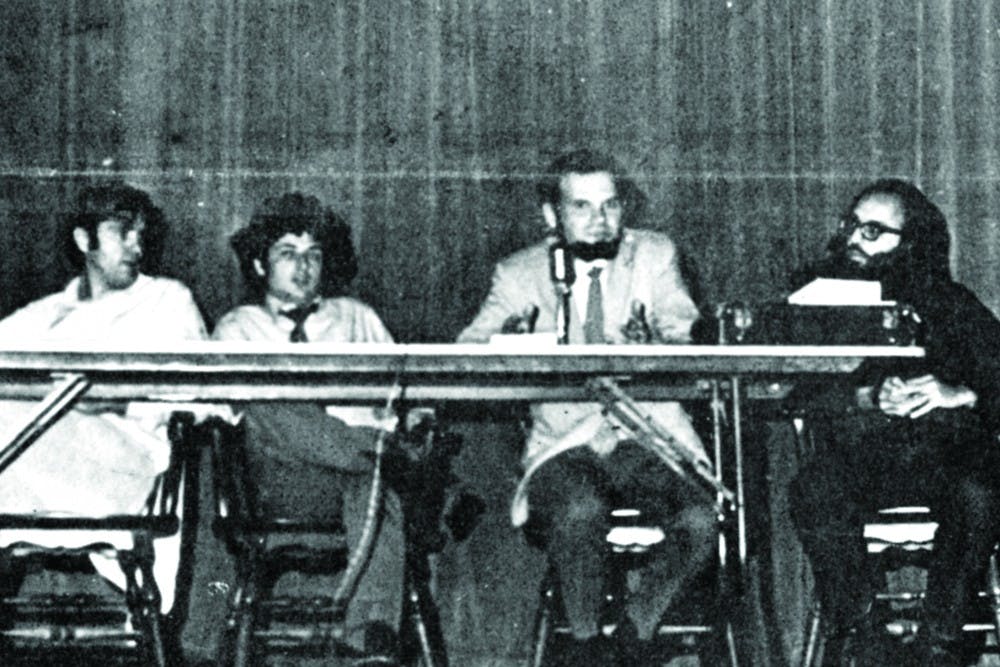At the end of a decade of social and political upheaval, Penn faculty members conducted a school-wide "Day of Conscience" on a Tuesday morning in March 1969. Over 800 students had crowded into Irvine Auditorium to hear from influential ecologist Barry Commoner and other speakers for a lively discussion about higher education and academic research.
Forty-nine years later, the Faculty Senate is now set to revive that historic moment during a four-day "teach-in" from March 18 to 22. The first of its kind since 1969, the teach-in will focus on "the production, dissemination, and use of knowledge."
The event will feature lectures, panel discussions, and other activities that celebrate the nuances and value of scholarship in the modern world. Some planned sessions include “Teaching Race: a Roundtable,” “The Knowledge and Practice of Well-Being,” and "Left, Right, and Center: Can We Talk about Sexual Harassment?"

One panel, “The Role of the University in Responding to and Shaping Immigration Law and Policy,” includes Miriam Enriquez, executive director of the Mayor's Office for Immigrant Affairs, Sozi Pedro Tulante, who recently joined Penn Law after serving as city solicitor for the City of Philadelphia, two distinguished Penn professors, and a Penn Law graduate.
The program, which is co-sponsored by the Undergraduate Assembly and the Student Committee on Undergraduate Education, is free and open to the public.
Faculty Senate Chair Santosh S. Venkatesh, who is a professor of electrical and systems engineering, said the debate about education today mirrors the controversies of the '60s.
“This is a particularly tumultuous time in our recent history,” Venkatesh said, noting the rise in anti-intellectual discourse and an increasing public distrust of the value of scholarship.
RELATED:
Was Trump really a top student at Wharton? His classmates say not so much
The newly-elected leaders for Penn's 5B minority coalition groups share their goals for 2018
A Pew poll released last year found that 58 percent of Republicans believe that colleges and universities have a negative effect on America.

“The academy itself seems to be under siege,” Venkatesh said. “If you start challenging that fundamental compact in society, then we are at a breakdown.”
He added that the goal of the teach-in is to “rekindle a compact between these academies of higher education and the body politic, or society at large.”
Student leaders and faculty members from all twelve schools were involved in planning the event, and Venkatesh said he hopes they will share their diverse perspectives.
“We want to create a conversation between all the parties involved,” Venkatesh said. “We are casting as wide a net as we possibly can.”
Computer and Information Science professor Norman Badler said that he initially thought that the teach-in would not be particularly relevant for scholars in his discipline, but eventually realized that it “could be an interesting way to educate the Penn community about what modern computer graphics and some machine learning methods are capable of doing.”

Norman Badler
Badler’s presentation on “Lies, Pixels, and Video Fakes” will address the technology behind image and video modification, a topic he says is “extremely current” and relevant to debates about "fake news."
“We felt collectively as a faculty that sitting idly by in the ivory tower is not an option,” Venkatesh said. “We should try to reach out."
Students will not even necessarily need to attend a session to reap the benefits of the teach-in. On March 20, a stretch of Locust Walk will transform into a walk through evolutionary time from primordial soup to homo sapiens.
Later that day, students can compete for prizes in an "augmented reality scavenger hunt" with 3D graphics expert Stephen H. Lane and graduate student Jonathan Lee of the Computer and Information Science department.



